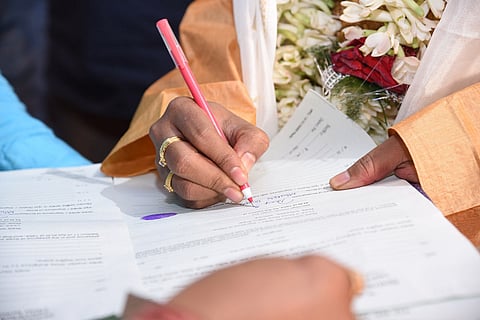

The Chief Justice of India has expressed reservations about doing away with certain provisions in the Special Marriage Act, 1954, which mandates publishing the private information about two adults from different religions, who want to get married, in a public space for 30 days. A Supreme Court bench led by CJI Sharad A Bobde was hearing a writ petition submitted by a law student from Kerala, stating that publishing the private details of the couples under the Act is a violation of their privacy. The Supreme Court has now sought a response from the Union government.
Under section 5 (notice of intended marriage) of the Special Marriage Act, 1954, the two individuals who intend to get married and solemnise the marriage under this law must give a notice in writing to the Marriage Officer or Registrar. As per section 6 (marriage notice book and publication’) of the Act, this notice should be published in some conspicuous place or the notice board in the office of the Marriage Officer for a period of 30 days in the offices where the two individuals have been residing.
What makes this provision contentious is that the notice, which is put in a public space, features the name, address, age, occupation, photos and signatures of both the bride and groom.
The Bench led by the CJI, has issued a notice to the government on the petition.
However, according to a report in The Hindu, CJI Bobde also made prima facie observation that these provisions intended to serve a different purpose.
“You do not understand the purpose of this law... What happens when a person runs away with another person’s daughter or wife? Why shouldn’t the father or the husband get to know about this? The individuals for whose benefit this law was enacted will suffer when it (the provisions) is removed,” the CJI was quoted as making an oral observation.
Incidentally, until a few months ago, these notices were even available on the website of the Kerala government’s Registration Department.
As TNM had reported earlier, many right-wing groups were able to access these notice, screen out the marriages between a Hindu woman and Muslim man, upload these notices across social media platforms and brand these relationships as ‘love jihad’.
However, after the report was published, G Sudhakaran, the Kerala Minister of Public Works and Registration, directed that these application forms should not be uploaded online, and that it need to be displayed only at sub-registrar office notice boards.
Although several couples had called out online targeting and harassment, an active campaign against this was initiated by Athira and Shameem, whose marriage application, too, was leaked online. Athira said she will file another petition in the court to remove the 30-day clause of putting these notices in a public space, as stipulated under the Special Marriage Act.